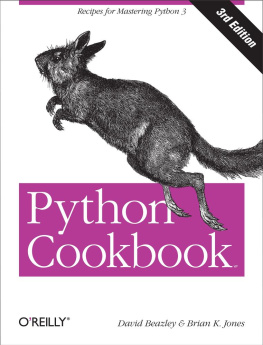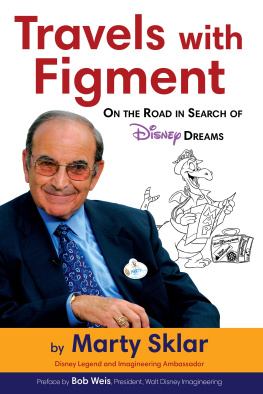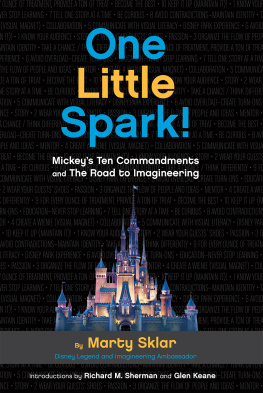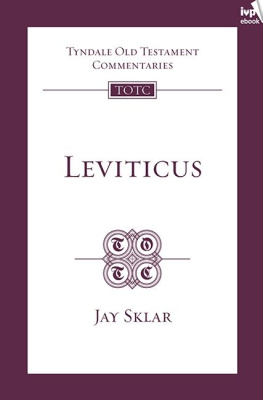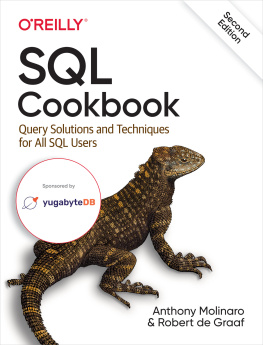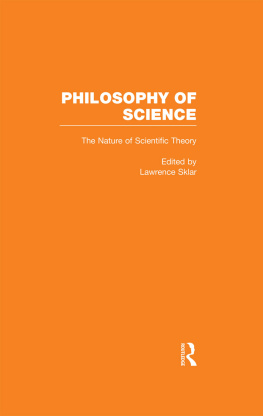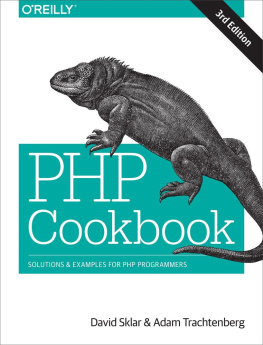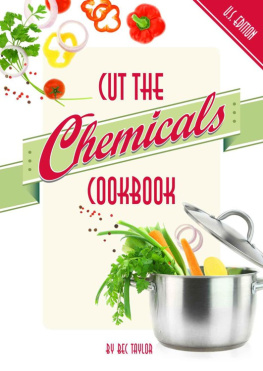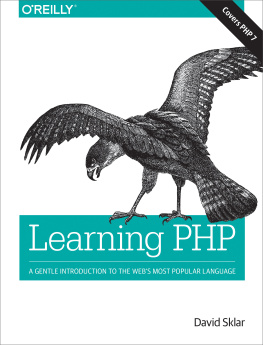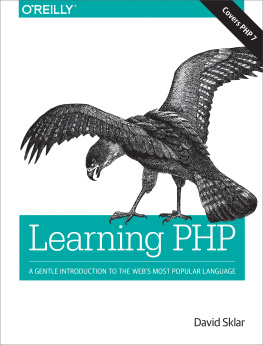David Sklar - PHP cookbook, 2nd Edition
Here you can read online David Sklar - PHP cookbook, 2nd Edition full text of the book (entire story) in english for free. Download pdf and epub, get meaning, cover and reviews about this ebook. year: 2006, publisher: Oreilly, genre: Computer. Description of the work, (preface) as well as reviews are available. Best literature library LitArk.com created for fans of good reading and offers a wide selection of genres:
Romance novel
Science fiction
Adventure
Detective
Science
History
Home and family
Prose
Art
Politics
Computer
Non-fiction
Religion
Business
Children
Humor
Choose a favorite category and find really read worthwhile books. Enjoy immersion in the world of imagination, feel the emotions of the characters or learn something new for yourself, make an fascinating discovery.

- Book:PHP cookbook, 2nd Edition
- Author:
- Publisher:Oreilly
- Genre:
- Year:2006
- Rating:4 / 5
- Favourites:Add to favourites
- Your mark:
- 80
- 1
- 2
- 3
- 4
- 5
PHP cookbook, 2nd Edition: summary, description and annotation
We offer to read an annotation, description, summary or preface (depends on what the author of the book "PHP cookbook, 2nd Edition" wrote himself). If you haven't found the necessary information about the book — write in the comments, we will try to find it.
PHP cookbook, 2nd Edition — read online for free the complete book (whole text) full work
Below is the text of the book, divided by pages. System saving the place of the last page read, allows you to conveniently read the book "PHP cookbook, 2nd Edition" online for free, without having to search again every time where you left off. Put a bookmark, and you can go to the page where you finished reading at any time.
Font size:
Interval:
Bookmark:
Copyright 2009 O'Reilly Media, Inc.
OReilly books may be purchased for educational, business, or sales promotional use. Online editions are also available for most titles (.
Nutshell Handbook, the Nutshell Handbook logo, and the OReilly logo are registered trademarks of OReilly Media, Inc. PHP Cookbook , Second Edition, the image of a Galapagos land iguana and related trade dress are trademarks of OReilly Media, Inc.
Many of the designations uses by manufacturers and sellers to distinguish their products are claimed as trademarks. Where those designations appear in this book, and OReilly Media, Inc. was aware of a trademark claim, the designations have been printed in caps or initial caps
While every precaution has been taken in the preparation of this book, the publisher and authors assume no responsibility for errors or omissions, or for damages resulting from the use of the information contained herein.

Supplemental files and examples for this book can be found at http://examples.oreilly.com/9780596101015/. Please use a standard desktop web browser to access these files, as they may not be accessible from all ereader devices.
All code files or examples referenced in the book will be available online. For physical books that ship with an accompanying disc, whenever possible, weve posted all CD/DVD content. Note that while we provide as much of the media content as we are able via free download, we are sometimes limited by licensing restrictions. Please direct any questions or concerns to .
PHP is the engine behind millions of dynamic web applications. Its broad feature set, approachable syntax, and support for different operating systems and web servers have made it an ideal language for both rapid web development and the methodical construction of complex systems.
One of the major reasons for PHPs success as a web scripting language is its origins as a tool to process HTML forms and create web pages. This makes PHP very web-friendly. Additionally, it is eagerly promiscuous when it comes to external applications and libraries. PHP can speak to a multitude of databases, and it knows numerous Internet protocols. PHP also makes it simple to parse form data and make HTTP requests. This web-specific focus carries over to the recipes and examples in the PHP Cookbook .
This book is a collection of solutions to common tasks in PHP. Weve tried to include material that will appeal to everyone from newbies to wizards. If weve succeeded, youll learn something (or perhaps many things) from PHP Cookbook . There are tips in here for everyday PHP programmers as well as for people coming to PHP with experience in another language.
PHP, in source code and binary forms, is available for download for free from http://www.php.net/. The PHP web site also contains installation instructions, comprehensive documentation, and pointers to online resources, user groups, mailing lists, and other PHP resources.
This book is for programmers who need to solve problems with PHP. If you dont know any PHP, make this your second PHP book. The first should be Learning PHP 5 , also from OReilly.
If youre already familiar with PHP, this book helps you overcome a specific problem and get on with your life (or at least your programming activities.) The PHP Cookbook can also show you how to accomplish a particular task in PHP, such as sending email or writing a SOAP server, that you may already know how to do in another language. Programmers converting applications from other languages to PHP will find this book a trusty companion.
We dont expect that youll sit down and read this book from cover to cover (although well be happy if you do!). PHP programmers are constantly faced with a wide variety of challenges on a wide range of subjects. Turn to the PHP Cookbook when you encounter a problem you need to solve. Each recipe is a self-contained explanation that gives you a head start toward finishing your task. When a recipe refers to topics outside its scope, it contains pointers to related recipes and other online and offline resources.
If you choose to read an entire chapter at once, thats okay. The recipes generally flow from easy to hard, with example programs that put it all together at the end of many chapters. The chapter introduction provides an overview of the material covered in the chapter, including relevant background material, and points out a few highlighted recipes of special interest.
The book begins with four chapters about basic data types. Chapter 1 covers details like processing substrings, manipulating case, taking strings apart into smaller pieces, and parsing comma-separated data. Chapter 2 explains operations with floating-point numbers, random numbers, converting between bases, and number formatting. Chapter 3 shows you how to manipulate dates and times, format them, handle time zones and daylight saving time, and find time to microsecond precision. Chapter 4 covers array operations like iterating, merging, reversing, sorting, and extracting particular elements.
Next are three chapters that discuss program building blocks. Chpater 5 covers notable features of PHPs variable handling, such as default values, static variables, and producing string representations of complex data types. The recipes in Chpater 6 deal with using functions in PHP: processing arguments, passing and returning variables by reference, creating functions at runtime, and scoping variables. Chapter 7 covers PHPs object-oriented capabilities, with recipes on OOP basics as well as PHP 5s new features, such as magic methods, destructors, access control, and reflection.
After the data types and building blocks come six chapters devoted to topics that are central to web programming. Chapter 8 covers cookies, headers, authentication, working with query strings, and other fundamentals of web applications. Chapter 9 covers processing and validating form input, displaying multipage forms, showing forms with error messages, and guarding against problems such as cross-site scripting and multiple submission of the same form. Chapter 10 explains the differences between DBM and SQL databases and, using PHP 5s PDO database access abstraction layer, shows how to connect to a database, assign unique ID values, retrieve rows, change data, escape quotes, and log debugging information. Chapter 11 covers PHPs built-in sessions module, which lets you maintain information about a user as he moves from page to page on your web site. This chapter also highlights some of the security issues associated with sessions. Chapter 12 discusses all things XML: PHP 5s SimpleXML extension and revamped DOM functions, using XPath and XSLT, and reading and writing both RSS and Atom feeds. Chapter 13 explores topics useful to PHP applications that integrate with external web sites and client-side JavaScript such as retrieving remote URLs, cleaning up HTML, and responding to an Ajax request.
The next three chapters are all about network interaction. Chapter 14 details the ins and outs of consuming a web serviceusing an external REST, SOAP, or XML-RPC service from within your code. Chapter 15 handles the other side of the web services equationserving up REST, SOAP, or XML-RPC requests to others. Both chapters discuss WSDL, authentication, headers, and error handling. Chapter 16 discusses other network services such as sending email messages, using LDAP, and doing DNS lookups.
Font size:
Interval:
Bookmark:
Similar books «PHP cookbook, 2nd Edition»
Look at similar books to PHP cookbook, 2nd Edition. We have selected literature similar in name and meaning in the hope of providing readers with more options to find new, interesting, not yet read works.
Discussion, reviews of the book PHP cookbook, 2nd Edition and just readers' own opinions. Leave your comments, write what you think about the work, its meaning or the main characters. Specify what exactly you liked and what you didn't like, and why you think so.

